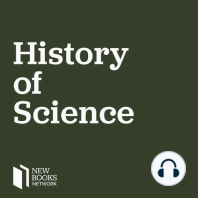59 min listen

Kirsten A. Greer, "Red Coats and Wild Birds: How Military Ornithologists and Migrant Birds Shaped Empire" (UNC Press, 2020)
Kirsten A. Greer, "Red Coats and Wild Birds: How Military Ornithologists and Migrant Birds Shaped Empire" (UNC Press, 2020)
ratings:
Length:
53 minutes
Released:
Aug 25, 2021
Format:
Podcast episode
Description
Remapping empire, nature, and scientific enquiry beyond the simple binary exchange between periphery and metropole, Dr. Kirsten Greer demonstrates how ornithology, the study of birds, became entwined with tours of duty for British military officers shaping military strategy and developing ecological understanding. A critical historical geography of empire, Red Coats and Wild Birds: How Military Ornithologists and Migrant Birds Shaped Empire (UNC Press, 2020) follows the travels and exploits of Capt. Thomas Wright Blakiston, surgeon Andrew Leith Adams, Lt. Col. Leonard Howard Lloyd Irby, and Capt. Philip Savile Grey Reid to demonstrate how collecting avian specimens and documenting migratory patterns created a new 19th C British military officer archetype: the Scientific War Hero. The scientific and geographic knowledge that these officers produced represents “a series of networks (human and non-human) connecting people, birds, and places across (and beyond) the British Empire These avian imaginations furthered the development of racist, nationalistic, and gendered ideas about particular places and climates. Situating migratory birds as national possessions reveals lasting colonial dynamics.
Learn more about your ad choices. Visit megaphone.fm/adchoices
Learn more about your ad choices. Visit megaphone.fm/adchoices
Released:
Aug 25, 2021
Format:
Podcast episode
Titles in the series (100)
Dagmar Schaefer, “The Crafting of the 10,000 Things: Knowledge and Technology in Seventeenth-Century China” (University of Chicago Press, 2011): In her elegant work of historical puppet theater The Crafting of the 10,000 Things: Knowledge and Technology in Seventeenth-Century China (University of Chicago Press, 2011), Dagmar Schaefer introduces us to the world of scholars and craftsmen in seven... by New Books in the History of Science